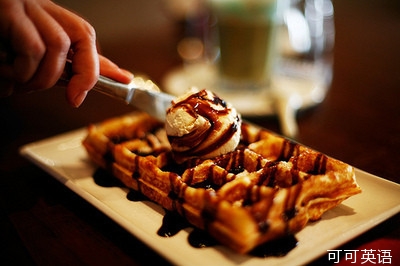(单词翻译:单击)

At the end of every day these items can be found on my desk at work: a large cardboard cup containing a residue of cold, brownish milk; a bag with grease marks and Danish pastry crumbs stuck to it; at least one empty can of Diet Coke; a wrapper that once contained an egg and cress sandwich; a banana skin and an empty Maltesers packet.
一天工作结束时,我的办公桌上总能找到以下物品:一个大号纸杯,里面喝剩下的一点牛奶已变成了棕色,早就凉了;一个粘着丹麦糕饼碎屑的油腻包装袋;至少一个健怡可乐(Diet Coke)的空罐子;曾包装鸡蛋水芹三明治的塑料薄膜;一个香蕉皮以及一个空的麦提莎巧克力球(Maltesers)包装袋。
For more than a decade I have been a devotee of dining al desko and have defended the practice to anyone who attacks it. I enjoy eating at my desk. Frequent visits to the vending machine punctuate the day and serve equally well for reward, for consolation and for an energy boost.
10多年来,我一直是桌边进餐的坚定拥护者,始终在批评者面前捍卫这种行为。我喜欢在办公桌边吃东西。对自动售货机的频繁造访,让我的一天打满“标点符号”,这是对我的奖励和安慰,还能帮我提神。
Last week I gave it all up. A visitor to the office would now find no trace of food on my desk, only a bone china cup, washed up and left neatly by my keyboard.
上周我放弃了这一切。如今,办公室的来访者在我的桌子上再也找不到任何食物的痕迹,只有一个洗干净后放在键盘边的骨瓷杯。
This radical transformation has come as a result of reading a column by the restaurant reviewer AA Gill, in which he expounds a new sort of diet. You can eat whatever you like in whatever quantity but must obey the following rules on how you do it. 1. Don’t eat anything that can’t be eaten with a knife and fork. 2. Eat at a table with a place set, preferably facing someone else who is also eating. 3. Never eat because you are hungry: always eat because it is lunchtime. 4. Never eat standing up. 5. Never eat anything with, or off, plastic or cardboard. 6. Never eat with a screen on in the same room. 7. All meals must have at least two courses, except breakfast.
发生这一根本变化的原因是,我阅读了餐厅评论家阿德里安•A•吉尔(AA Gill)的一篇专栏文章。他推崇一种新的饮食方式。你可以想吃什么吃什么、爱吃多少吃多少,但必须遵守怎么吃的规则:1. 不要吃任何不能用刀叉吃的食物;2. 在指定场所的桌边吃东西,最好是面对其他同样在吃东西的人;3. 永远不要出于饥饿吃东西,而是到午餐时间再吃东西;4. 永远不要站着吃东西;5. 永远不要用塑料或纸板餐具吃东西,也不要吃这类餐具中盛着的食物;6. 永远不要在有显示屏的房间吃东西;7. 除了早餐以外,每次用餐至少须有两道菜。
At home, I have always more or less followed this diet. There are not many things left in life that I unambiguously believe in, but the family mealtime – with everyone sitting round a table, which has been laid in advance – is one of them.
在家里,我总是或多或少能按这些规则进餐。我生活中深信不疑的信条不多,而家庭用餐就是其中之一——所有人都应围坐在事先摆好的餐桌边进餐。
Yet if this diet comes so naturally at home, why do I abandon it the minute I get to work? The detritus on my desk shows that every day I break all the rules. I even flout rule #4 and eat the first couple of Maltesers on the journey from vending machine to desk.
不过,既然我在家里遵守进餐规则如此自然,为什么我上班时就要放弃规则呢?办公桌上的碎屑表明,我每天都打破了所有规则。我甚至连4号规则都无视了——我会一边从自动售货机往办公桌的方向走,一边吃掉第一对麦提莎巧克力球。
You could say the fault isn’t mine, it is that offices invite uncivilised eating. My mother – a great believer in putting milk in jugs – is not there to advise and I am surrounded by colleagues, slurping and munching their way through the day.
你可能会说这不是我个人的错,问题在于办公室鼓励不文明的吃法。我的母亲是一位“牛奶应放在奶壶中”的拥趸,但她不在我身旁,无法为我提供建议。在我的身边围着的,是整天咀嚼着走来走去的同事们。
I set out to see what office life would be like following Gill’s rules. The first change is that you have to have breakfast at home – which turns out to be an instant improvement as your own kitchen is the ideal place for breakfast and a belly full of porridge and toast is a better start to the day than a greasy Danish.
我开始考察,当人遵循吉尔规则时,办公室生活会变成什么样?第一个变化就是你不得不在家吃早餐。这一变化被证明会立竿见影地改善生活,因为自己厨房正是理想的早餐场所,而且比起油腻的丹麦点心,肚里装满麦片粥和烤面包更适宜作为一天的开始。
Mid-morning I made a jug of coffee in the office, offered it round and drank mine from a china cup. This was so agreeable – better coffee, cheaper and more sociable – it made me wonder what I’ve been doing all these years sucking lattes out of a hole in a plastic lid like a baby drinking from a beaker.
半晌午的时候,我在办公室泡了一壶咖啡,将它分给众人,并用瓷杯喝了一杯。更棒的咖啡、更低廉的价格以及更友好的同事关系——所有这一切都如此令人愉快,以至于我感到奇怪,这么多年来我到底在干什么——像个从烧杯里喝水的婴儿一样,从塑料盖上的小洞里吮吸拿铁?
At lunchtime on Day One, I went out with a colleague to buy a sandwich and some fruit, which we ate at a small table in his office. It was OK but the wrapping was non-compliant and I was eating with my hands. So on Day Two, I broached the office canteen, where I haven’t eaten in years. There I ate hot food on crockery with a knife and fork that I also used for my banana, which oddly tasted better as a result. The food wasn’t great, but the break in the day, the enforced conversation with colleagues and the superior feeling that comes from being civilised more than made up for it.
第一天的午餐时分,我与一位同事一同出门,买回个三明治和一些水果,在他办公室的一张小桌边吃了。这么吃问题不大,不过食品的包装不合规定,而且我是用手拿着吃的。于是,第二天我开始去多年没去的公司食堂吃饭了。在那里,我用刀叉吃了装在陶瓷餐具里的热食,连香蕉也是用刀叉吃的。奇怪的是,香蕉用刀叉吃起来似乎也更好吃一点。这些食物吃起来感觉一般,不过由此享受到的日间休息、同事间不得不进行聊天,以及成为文明人的优越感,其好处远远弥补了这一缺陷。
Mid-afternoon I went without Maltesers but didn’t miss them. Nor did I miss the Diet Coke. Instead I made a pot of tea for everyone and, thinking of my mum, even put the milk in a jug.
下午三点左右,我没有吃麦提莎巧克力球,不过我并不想念它们。同样,我也没有怀念健怡可乐。相反,我为所有人泡了一壶茶,而且由于想到了我母亲,我甚至把牛奶也放到了奶壶里。
The reason it was so easy is that food itself is curiously forgettable; what is not forgettable is the anticipation and the ritual. The knowledge that I was going to eat properly at lunchtime made the anticipation sweeter. Equally, the ritual of warming the teapot does the soul good.
做到这一切如此容易,是因为食物本身是很容易忘记的——这一点有点奇怪。不容易忘记的是那种期待和用餐方式。午餐时我会正儿八经的吃东西,这种想法让我对午餐的期待更为甜美。同样,加热茶壶的过程也能我帮我提神。
Set against the benefits of this new diet – which is convivial, civilised, healthy, cheap, tidy and creates little rubbish – the only disadvantage is that it makes you disagreeably smug. With all the intolerance of a brand new convert, I have been giving filthy looks to the man who sits next to me as he stuffs a cheese croissant into his mouth while gawping at the screen.
与新饮食方式的好处(融洽、文明、健康、廉价、整洁而又不产生什么垃圾)相比,唯一不足之处是它会让你沾沾自喜。出于所有初皈依者的零容忍心态,在身旁那位男士边盯着屏幕边把奶酪牛角包塞进嘴巴时,我总是向他投去鄙夷的目光。
So far my disapproval hasn’t created many disciples. However, the diet is so good, I think coercion might be called for. Companies should get rid of all their vending machines and make the canteen the heart of office life, just as the kitchen is the centre at home.
到目前为止,我的反对没招来任何追随者。然而这个饮食方式这么棒,我想可以提议强制推行一下。企业应挪走所有自动售货机,把食堂作为办公室生活的核心,正如厨房是家庭中心那样。


